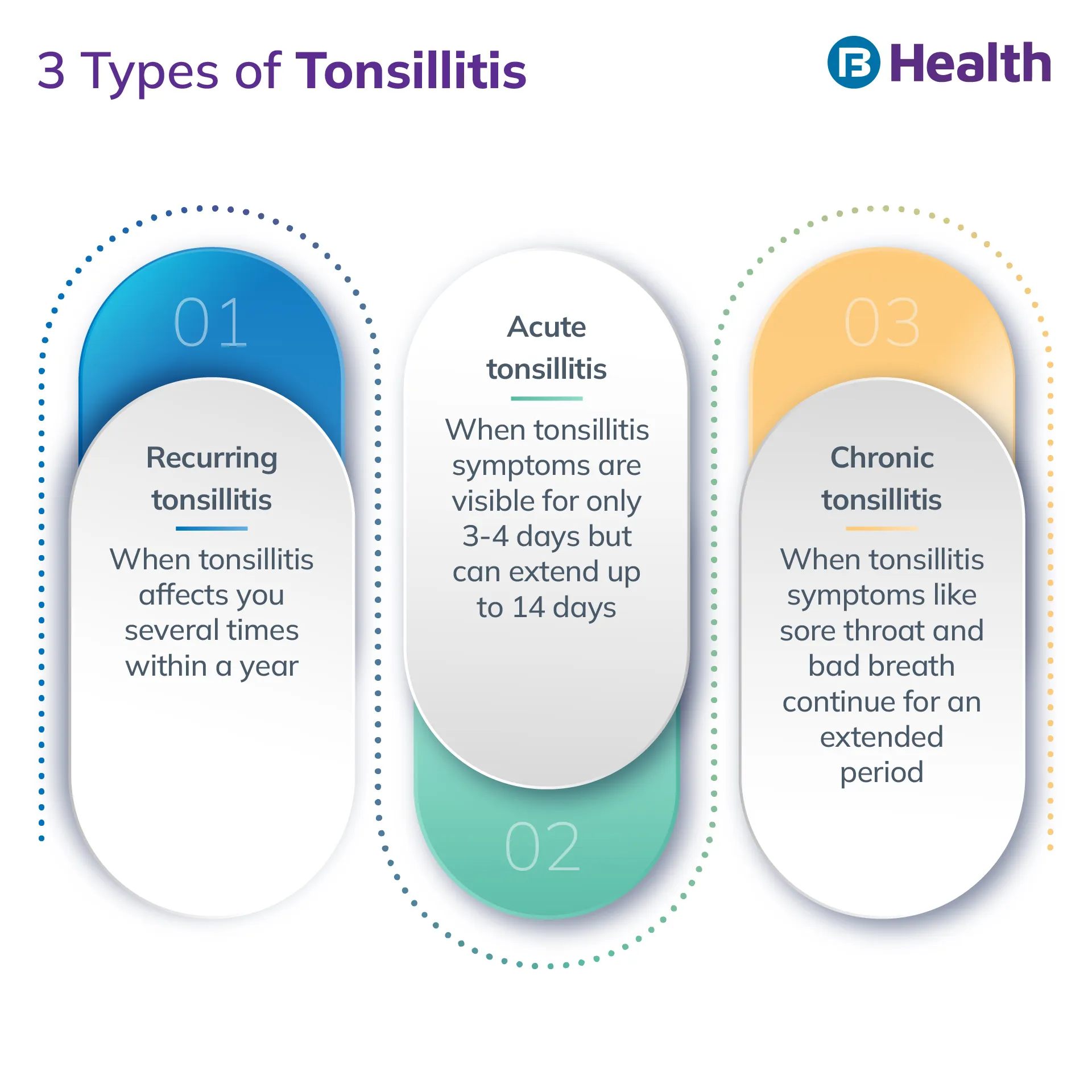ENT | 6 min read
Tonsillitis: Symptoms, Causes, Risk Factor, Types and Treatment
Medically reviewed by
Table of Content
Synopsis
Tonsillitis causes severe throat pain which makes it for you difficult to swallow. Bad breath and sore throat are a few other tonsillitis symptoms. Read to learn more about tonsillitis treatment.
Key Takeaways
- Tonsillitis and tonsil stones cause sore throat issues
- Bacterial or viral infections are main tonsillitis causes
- Tonsillectomy is the surgery for tonsillitis treatment
Tonsillitis is a condition that affects your tonsils. Tonsils are two lumps of soft tissue situated at the back of your throat. The primary function of tonsils is to prevent germs from entering your respiratory airways. In a way, tonsils act as filters by keeping you safe from diseases. Tonsils also activate antibodies in your body to fight pathogens. Sore throat is the most common tonsillitis symptoms.
When these soft lumps get infected, it results in tonsillitis. In such cases, your tonsils become inflamed and swollen. Sore throat is one of the most common tonsillitis symptoms. Though tonsillitis is common among children, adults can get affected too. Children between the age groups of 3 and 11 years are more prone to get tonsillitis. According to a report, approximately 9-17% are affected by tonsillitis [1].
It is easy to diagnose tonsillitis, and its symptoms subside within a week. Most tonsillitis symptoms resemble strep throat symptoms. However, if you have strep throat, you are more likely to have a high fever than tonsillitis. While you can cure tonsillitis by allopathy, there are many effective ayurvedic remedies.
Just like you have ayurvedic treatment for cold and cough, ayurvedic preparations like Agastya Rasayana and spatial prove effective for curing tonsillitis. To understand more about tonsillitis causes, symptoms, and tonsillitis treatment, read on.
Additional read: Ayurvedic Treatment for Cold and Cough
Tonsillitis Causes
Tonsils play a vital role in defending your body against diseases. They also produce white blood cells that aid your body's germ-fighting ability. While tonsils are efficient in warding off viruses and bacteria, these microorganisms can also cause an infection in your tonsils. One such bacterial infection called strep throat can cause tonsillitis.
The common cold is another infection that can aggravate tonsillitis. The main bacteria responsible for causing tonsillitis is Streptococcus pyogenes, though other strains can also cause tonsillitis. Up to 70% of tonsillitis is caused by a virus causing cold or flu.
Similar to tonsillitis, another condition called tonsil stones also affects your tonsils. If your tonsils contain small hard lumps, it results in tonsil stones. Tonsil stones do not cause any pain. Also called tonsilliths, the primary sign of tonsil stones is bad breath. While tonsil stones are harmless and can be treated at home, in some cases, you may need surgery to remove the tonsils. Tonsil stones occur when any substance gets lodged in tonsillar crypts. This hardens to form tonsil stones. The substance can be a mineral, a pathogen, or even food.
Tonsillitis Symptoms
Now that you are familiar with tonsil stones and tonsillitis causes, here are a few tonsillitis symptoms for you to know.
- Foul-smelling breath
- Pain in the ear
- Severe sore throat
- Fever
- Stiffness in the neck
- Pain while trying to swallow
- Headache
- The appearance of yellow or white spots in the tonsils
- Swelling of tonsils that turns red in color
- Formation of ulcer in the throat
- Poor appetite
In children, you can observe the following tonsillitis symptoms.
- Severe pain in the stomach
- Vomiting
- Stomach indigestion

Tonsillitis Risk Factors
Age plays a major factor in acquiring tonsillitis. Young children are at a higher risk of getting viral tonsillitis, while bacterial tonsillitis is common among age groups of 5-15 years. Therefore, if you are exposed to germs frequently, you have a higher risk of getting tonsillitis. In case your work involves interacting with young children, you may be prone to getting tonsillitis.
Tonsillitis Diagnosis
Initially, your doctor will look for the redness and swelling of the tonsils. After a temperature check, your doctor may check for any infection in the nose and ears. Further, you may have to undergo the following tests to understand the tonsillitis causes.
- Blood test to determine if a bacteria or virus is the main cause of tonsillitis
- Rash test to understand if a strep throat infection is the cause of tonsillitis
- Throat swab to check if strep bacteria has caused tonsillitis
Additional read: Blood Test Help to Strengthen the Immune System
Tonsillitis Complications
If tonsillitis is caused by bacteria, you may observe the following complications.
- Infection in your middle ear
- Tonsillar cellulitis in which your tonsillitis infection spreads to the surrounding tissues
- Problems in breathing during your sleep
- A buildup of pus on the backside of the tonsils

Tonsillitis Treatment
Depending on the organism responsible for causing tonsillitis, your doctor devises a suitable tonsillitis treatment plan. You may have to take antibiotics to reduce bacterial tonsillitis. It is important to complete the antibiotic course even if your tonsillitis symptoms subside. In the case of viral tonsillitis, antibiotics may not be of great help. Your body takes its time to fight the viral infection. A few home remedies that can provide you relief from tonsillitis include:
- Taking proper rest
- Drinking warm water and plenty of fluids
- Gargling with salt water
- Having pain relievers such as ibuprofen
- Using humidifiers to purify the air in the room
- Consuming lozenges like strepsils to ease your throat pain
- Eating warm and smooth foods to reduce sore throat
If your tonsillitis gets severe, which makes it difficult for you to eat and breathe, your doctor may suggest that you get your tonsils removed. Tonsillitis surgery, known as a tonsillectomy, involves the removal of tonsils using a sharp blade. A few other methods of tonsillectomy include the usage of radio waves, laser, or electrocautery for removing tonsils.
You can recover within a week after tonsillectomy. While you may get relief from tonsillitis symptoms, there is a possibility of the throat or ear pain after tonsil removal. By drinking plenty of fluids and taking prescribed pain killers, you'll start to feel better.
Now that you know about tonsil stones and tonsillitis, takes simple measures to avoid any infections from affecting your tonsils. Practice good hygienic measures to stay away from tonsillitis. By washing your hands regularly, you can prevent the spread of germs causing tonsillitis. In case you have a sore throat or any other tonsillitis symptoms, you can reach out to reputed ENT specialists on Bajaj Finserv Health. Get a doctor's consultation and address your tonsillitis symptoms without any delay. Follow proper measures as your doctor prescribes and nip tonsillitis right in the bud! If you want to protect yourself from any disease, you can avail of health insurance.
References
- https://www.omicsonline.org/india/tonsillitis-peer-reviewed-pdf-ppt-articles/
Disclaimer
Please note that this article is solely meant for informational purposes and Bajaj Finserv Health Limited (“BFHL”) does not shoulder any responsibility of the views/advice/information expressed/given by the writer/reviewer/originator. This article should not be considered as a substitute for any medical advice, diagnosis or treatment. Always consult with your trusted physician/qualified healthcare professional to evaluate your medical condition. The above article has been reviewed by a qualified doctor and BFHL is not responsible for any damages for any information or services provided by any third party.




